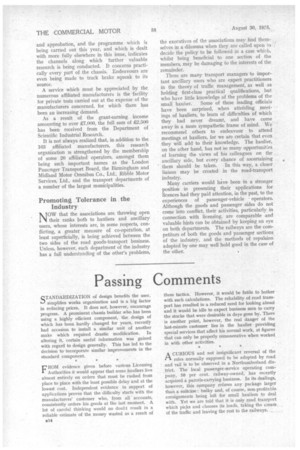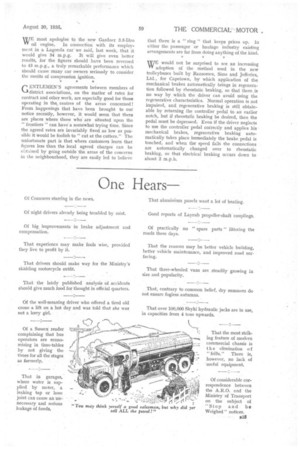Passing Comments
Page 20

Page 21

If you've noticed an error in this article please click here to report it so we can fix it.
STANDARDIZATION of design benefits the user, simplifies works organization and is a big factor in reducing prices. It does not, however, encourage progress. A prominent chassis builder who has been using a highly efficient component, the design of which has been hardly changed for years, recently had occasion to install a similar unit of another make which required drastic modification. In altering it, certain useful information was gained with regard to design generally. This has led to the decision to -incorporate similar improvements in the standard component.
FROM evidence given before various Licensing A Authorities it would appear that some hauliers live almost entirely on orders that must be rushed from place to place with the least possible delay and at the lowest cost. Independent evidence in support of applications proves that the difficulty starts with the manufacturers' customer who, from all accounts, consistently orders his goods at the last moinent. A lot of careful thinking would no doubt result in a reliable estimate of the money wasted as a result of
these tactics. However, it would be futile to bother with such calculations. The reliability of road transport has resulted in a reduced need for looking ahead and it would be idle to expect business men to carry the stocks that were desirable in days gone by. There • is another point, however, the real danger of the last-minute customer lies in the haulier providing special services that affect his normal work, at figures that can only be properly remunerative when worked in with other activities.
A CURIOUS and not insignificant reversal of the
roles normally supposed to be adopted by road and rail is to be observed in a Northumberland district. The local passenger-service operating company, 50 per cent. railway-owned, has recently acquired a parcels-carrying business. In its dealings, however, this company refuses any package larger than a suitcase: bulky and, of course, non-profitable. consignments being left for small hauliers to deal with. Yet we are told that it is only read transport which picks and chooses its load's, taking the cream of the traffic and leaving the rest to the railways. _ WE must apologize to the new Gardner 3.8-litre
oil engine. In connection with its employment in a Lagonda carwe Said, last week, that it would give 34 m.p.g. It will give even better results, for the figures should have been reversed -to 43 m.p.g., a truly remarkable performance which should cause many car owners seriously to consider the merits of compression ignition.
ENTLEMEN'S agreements between members of
district associations, on the matter of rates for contract and other work, are especially good for those operating in the centres of the areas concerned From happenings that have been brought to our notice recently, however, it would seem that there are places where those who are situated upon the " frontiers " can have' a somewhat trying time. Since the agreed rates are invariably fixed as low as possible it would be foolish to " cut at the cutters." The unfortunate part is that where customers learn that figures less than the local agreed charges can be obtained by going outside the areas of the concerns in the neighbourhood, they are easily led to belimie
that there is a " ring " that keeps prices up. In either the passenger •or haulage industry existing arrangements are far from doing anything of the kind.
WE would not be surprised to see an increasing adoption of the method used in the new trolleybuses built by Ransomes, Sims and Jefferies, Ltd., for Capetown, by which application of the mechanical brakes automatically brings in regeneration followed by rheostatic braking, so that there is no way by which the driver can avoid using the regenerative characteristics. Normal operation is not impaired, and regenerative braking is still obtainable by returning the controller pedal to an earlier notch, but if rheostatic braking be desired, then the pedal must be depressed. Even if the driver neglects to use the controller pedal correctly and applies his mechanical brakes, regenerative braking automatically takes place immediately the 'brake pedal is touched, and when the speed falls the connections are automatically changed over to rheostatic braking, so that electrical braking occurs down to about 2 m.p.h.












































































